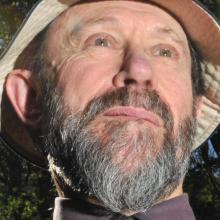
This year continues to be marked by World War 1 commemorations, while other significant anniversaries are overlooked. One was the publication of a book "hastily completed in the last days before a period of imprisonment."
The author was Bertrand Russell, the English mathematician and philosopher, considered even by his enemies the "most able man of his day." His imprisonment was for resisting the Military Service Act and the book was entitled Roads to Freedom: Socialism, anarchism and syndicalism.
We still hear about socialism, but 20th century political, military and economic leaders marched sleep-walking populations to mass murder in the causes of nationalism, authoritarian communism and fascism while the other two roads to freedom were largely written out of history. Nevertheless, the 1921 Moscow funeral of anarchist Peter Kropokin was marked by a demonstration of dissent when an estimated 100,000 people marched. It is reported that Lenin’s offer of a state funeral was declined.
Among those present was Aaron Baron who, according to Victor Serge, was released from prison for the day. This was clearly an error by the state police because he "cried out in defiant protest against the new despotism, against the butchers at work in the dungeons, against the dishonour that had been brought upon socialism, against the violence by which the government was trampling the revolution under foot". Clearly, he could seewhere Russia was heading.
Similar patterns developed elsewhere. In his history of the Spanish civil war, Hugh Thomas records that the 1936 funeral procession for the anarchist Buenaventura Durruti took all day to pass down the Diagonal, Barcelona’s widest street. Thomas argued that this marked the end of the "classic age" of Spanish anarchism and syndicalism. It also marked a step towards victory for fascism. The so-called democratic states turned a blind eye to German and Italian war crimes in support of a military coup against the civilian Spanish population.
In early 20th century NZ, the small radical minority was ruthlessly censored and suppressed under the rising tide of adherence to British imperialism. Tom Barker’s satirical poster (smuggled across the Tasman) was, on judge’s orders, torn down from outside the Supreme Court in 1915. It called: "To arms! Capitalists, Parsons, Politicians, Landlords, Newspaper Editors and Other Stay-at-Home Patriots, your country needs YOU in the trenches!! Workers follow your masters." The egalitarian message was clear.
So, despite alternatives, why did people in the 20th century "choose" tyranny, war, mass murder, destruction and financial instability rather than the liberation of mutual co-operation offered by the roads to freedom Russell identified? A challenging question, but clearly vested military, political and economic interests were at stake — and still survive.
Such interests defended Margaret Thatcher’s untruth that "there is no alternative". In the UK, many families that exert political and economic power owe that privileged status to wealth inherited from the slave trade and other exploitation. This continuity in the power of old wealth has recently been highlighted again by the economist Thomas Piketty.
Why was this permitted to continue after millions died in wars supposed to bring peace and freedom? Did ruling cliques capture the state and its agencies the better to ensure that it defended their privileges instead of protecting everyone equitably?
In contemporary NZ, we face a "housing crisis", but does anyone ask why it is acceptable for people to spend a lifetime paying rent to live in a home that is owned by someone else who uses it as a means for income and intergenerational privilege?
On top of the construction costs of labour and materials, and subsequent maintenance, there is the added cost of payments to property speculators and banks.
Why do we put up with such distorted social relations when we could build a society based on co-operation and equality? Why was Iceland unique in convicting numerous bankers of antisocial crimes during the 2008 financial crisis they caused?
Was a collective "wrong turn" taken last century? Why do we continue to ignore alternative potential roads to genuine freedom? Today humanity faces the risk of self- extinction while engrossed in the trivial, commercially promoted distractions of celebrity culture and unsustainable, unhealthy indulgence.
It seems unlikely that our present condition represents the peak of democratic opportunity: a state of being governed by revolving majoritarian political parties rather than living with stable, participatory democracy where we work and live, with goods and services administered and distributed equitably.
Such fundamental questions deserve to be asked and the anniversary of Russell’s 1918 book is a suitable time. Rather than only commemorating catastrophic war crimes we could learn from looking into those alternative, co-operative ways of organising social life that were on the agenda before militarism helped reinforce a conformist straitjacket.
- Tony Reeder is an amateur historian and Dunedin School of Medicine associate professor.












